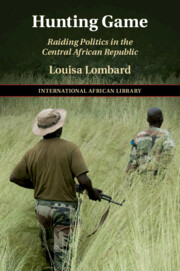Book contents
- Hunting Game
- The International African Library
- Hunting Game
- Copyright page
- Contents
- Figures
- Maps
- Acknowledgements
- Abbreviations and acronyms
- Map
- 1 Force, status, and uncertainty in the arts of acquisition
- 2 Zariba contests and collaborations
- 3 Manhunts persist in an unfortunate colony
- 4 Big-game hunting and regulatory sociality
- 5 The limits of law in coercive conservation
- 6 Camouflage skills
- 7 Denunciation and liberty
- 8 Force and status in rebellion
- 9 Sovereignty and distribution amid forceful acquisition
- References
- Index
- Titles in the series
7 - Denunciation and liberty
Published online by Cambridge University Press: 20 April 2020
- Hunting Game
- The International African Library
- Hunting Game
- Copyright page
- Contents
- Figures
- Maps
- Acknowledgements
- Abbreviations and acronyms
- Map
- 1 Force, status, and uncertainty in the arts of acquisition
- 2 Zariba contests and collaborations
- 3 Manhunts persist in an unfortunate colony
- 4 Big-game hunting and regulatory sociality
- 5 The limits of law in coercive conservation
- 6 Camouflage skills
- 7 Denunciation and liberty
- 8 Force and status in rebellion
- 9 Sovereignty and distribution amid forceful acquisition
- References
- Index
- Titles in the series
Summary
Force itself is not as straightforward as it might at first appear. Stealth proved a communicative endeavour; Chapter 7 shows that force is too. What does force intend to communicate in the context of armed conservation and acquisitive politics? Who is the intended audience? What values underlie the actors’ moves? Pisteurs often use the idiom of vengeance to answer those questions, or that of why they pursue manhunts. But vengeance invites further exploration, too. It has often been thought of as a mode of law, a balancing mechanism. Vengeance, in the way in which pisteurs, hunters, and herders enact it, in contrast, is a means of communicating a claim to status. Who is not to be messed with? Who can be subjected to seizure or other insults? How does one respond if attacked? Recourse to vengeance is particularly valuable to people who do not have reliable access to institutional means of protection; it is a mode of denunciation, and a claim to sovereignty, oriented not towards control but towards liberty. Denunciation, like vengeance, is conversational – only in rare cases is it so definitive as to become a Parthian shot, and instead it often becomes a continuing cycle. Few are happy that denunciation is so prevalent, but many see their own denunciations as necessary. By denouncing, they claim an exception from violence that would demean but not include them, as well as from associated rules and norms, and as such it is a process of solidarity and claiming liberty.
- Type
- Chapter
- Information
- Hunting GameRaiding Politics in the Central African Republic, pp. 167 - 190Publisher: Cambridge University PressPrint publication year: 2020

